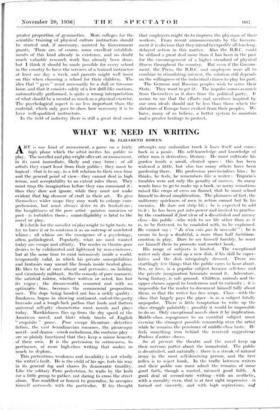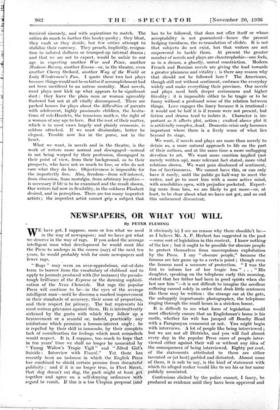WHAT WE NEED IN WRITING
By ELIZABETH BOWEN
ART is one kind of amusement, a game on a fairly- high plane which the artist invites his public to play . The novelist and playwright offer art, or amusement. in its. most immediate, likely and easy form ; of all artists they exact least from their public.; they must be topical—that is to say, in a felt relation to their own time and the general point of view—they cannot deal in high terms, and acceptability to an extent rules them. They must trap the imagination before they can command it thus they dare not ignore, while they must not make evident that big element of craft in their art. To give theimelves wider scope they may work to enlarge com- prehension, but must always defer to its limitations ; the haughtiness of the pure artist—painter, musician or poet—is forbidden them ; unintelligibility is fatal to the novel or play.
It is futile for the novelist or playwright to light taste, to -try to force it or to contemn it as an outcrop of unrelated whims:. all . whims are the emergence of a psychology, often pathological. Popularly, what are most wanted today are escape and affinity. The reader or theatre-goer desires to be exhilarated and lightened by non-existence, but at the same time to exist intensively inside a world, temporarily valid, in which his private susceptibilities and fantasies may uncurl like fronds inside heated glass. He likes to be at once absent and pervasive, on holiday and vicariously militant. So the comedy of pure manners, the satirical mirror, whether written or acted, has lost its vogue ; the dream-world, censored and with an optimistic bias, becomes. the commercial proposition now. The dope being handed put has a sickly quality : frankness, bogus. in showing sentiment, end-of-the-Tarty, bravado and a tough-luck pathos that feeds and flatters -universal self-pity characterise most, novels and plays today. Mawkishness flies .up from the dry speed of the American novel, and blots _whole tracts of ,English " exquisite" prose.: Pure escape literature detective, fiction, the vast Scandinavian romance, .the picaresque novel—and drama—crook melodrama, the costume play- . are so plainly functional that they. keep a minor honesty, of their own. It is the pretension to seriousness, to pertinenee, of more high-clasS writing that makes so much to deplore.
This pretentious weakness and invalidity is not wholly the writer's fault. He is the child of his age,.feels his way in its general fog and shares its democratic timidity, Like" the solitary Paris pedestrian, he waits by the kerb for a little group to gather, not daring to cross the street alone. Too muddled or honest to generalise, he occupies himself nervously with the particular.' If his thought attempts any unfamiliar track it loses itself and come:: back in a panic. His self-knowledge and knowledge of other men is derivative, literary. He must cultivate his garden inside a small, cleared space : this has been widened a little, but also too many others have been gardening there. His profession provincialises him ; he thinks, he feels, he remembers like a writer : Trigorin's troubles were not only the penalty of success. So many words have to go to make up a book, so many sensations raised like crops of cress on flannel, that he must school himself to dread simplification. The plainness of fact, the unliterary quickness of men in action cannot but tie his enemies. He dare not strip life ; lie is expected to add to it ; he has been put into power and invited to practise by the emotional il faul vivre of a dissatisfied and uneasy class—his public—who wish to see life other than as it is, to be flattered, to be condoled with, to be explained. He cannot say : " Jc n'en vois pas la itecessite" : he is sworn to keep a doubtful, a more than half factitious. emotion in play. Dare lie see himself harshly, he must see himself there to promote and market bunk.
His range of subjects is limited. The exceptional writer only dare send up a new dish, if his skill be super- lative and the dish intriguingly dressed. .There are startlingly few things that the public cares to hear about. Sex, or love, is a popular subject because self-love and the private imagination luxuriate round it. Adventure, being fantasy, is safe ground. Children, animals and the upper classes appeal to tenderness and to curiosity : it is impossible for the reader. to document himself fully about. them, so that the writer has free scope. Class—with the class that largely pays the piper—is as a subject fatally unpopular. There is little temptation to write up the class struggle palatably : possibly it would be impossible to do so...Only exceptional novels show it by implication. Middle-class _repugnance to an essential subject must exercise. the strongest possible censorship .over the artist while,he remains the pensioner of middle-class taste. He feels. something iron behind the received suggestiour Parlon.s d'auIres chose& So at present the theatre and the novel keep up their. nervous patter about the immaterial. The public is dissatisfied, and naturally -: there is a streak .of natural irony in the most self-deceiving person, and the first ,reflex is to reject bunk, In the traffic between writers ,.and their public one must admit the remains of. some „good faith, though a wasted, misused good faith. A ., good deal of second-rate writing-7with an aesthetic, with a morality even, that is at first sight impressive.--is turned out sincerely, and with high aspirations, and received sincerely, and with aspirations to match. The critics do much to further this hanky-panky ; they bleat, they exalt or they deride, but few critics attempt to stabilise their currency. They preach, implicitly, resigna- tion to inflated dullness or trumped-up internal drama ; and that we are not to expect, would be unfair to our age in expecting another War and Peace, another Madame Borary, another Emma—or, in the theatre, even another Cherry Orchard, another Way of the World or Lady Windermere's Fan. I quote these two last plays because things would not be so bitter if accomplishment had not been sacrificed to an untrue morality. Most novels, most plays now kick up what appears to be significant dust : they leave the plain man or woman agreeably flustered but not at all vitally discomposed. There are packed houses for plays about the difficulties of parents with adolescent, highly passionate children, the hesita- tions of sub-Hamlets, the tenacious mother, the right of a woman of any age to love. But the root of their matter, which is in most cases largely and plainly economic, is seldom attacked. If we must dissimulate, better be elegant. Trouble now lies in the purse, not in the ' heart.
What we want, in novels and in the theatre, is the work of writers more normal and disengaged—normal in not being warped by their profession, disengaged in their point of view, from their background, as to their prospects, who have not so much to lose, or who do not care what they do lose. Objectiveness is impossible for the imperfectly free. Also, freedom—from self-interest, from obsession, from nostalgia, from arbitrary loyalties— is necessary if life is to be examined and the result shown. Our writers fail now in flexibility, in the coldness Flaubert desired, and in perception. There are too many imperfect artists ; the imperfect artist cannot grip a subject that has to be followed; that does not offer itself or whose acceptability is not guaranteed—hence the present hedging timidness, the re-translation of cliches. It is not that subjects do not exist, but that writers are not empowered to tackle them. At present the greater number of novels and plays are claustrophobic—one feels, as in a dream, a ghastly, unreal constriction. Modern French and Russian novels are giving the lead towards a greater plainness and vitality : is there any reason why that should not be followed here ? The Americans, though still not without sentiment, embrace the everyday widely and make everything their province. Our novels and plays need both deeper seriousness and higher frivolity : it is impossible either to be tragic or to be funny without a profound sense of the relation between things. Love engages the fancy because it is irrational : it would not be half it is if reason were not present, but fiction and drama tend to isolate it. Character is im- portant as it affects plot, action ; exalted above plot it is artificially complex, dead. Domestic crisis only becomes important where there is a lively sense of what lies beyond its stage.
We want, if novels and plays are more than merely to detain us, a more natural approach to life on the part of their authors, and at the same time a more unflagging devotion to art. We want more emotion implied (not merely written up), more relevant fact stated, more vital relations shown. We want pain disabused of sentiment, fun of facetiousness. We cannot have this, or can only have it rarely, until the public go half-way to meet the writer, and go to meet him with a more active mind, with sensibilities open, with prejudice pocketed. Expect- ing more from him, we are likely to get more—or, at least, to be clear about what we have not got, and so end this unfocussed discontent.





























































 Previous page
Previous page